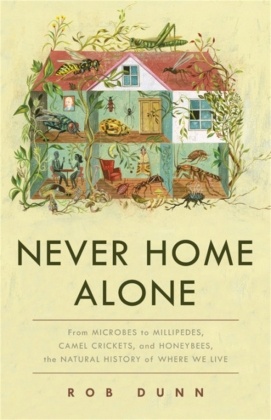Never Home Alone - From Microbes to Millipedes, Camel Crickets, and Honeybees, the Natural History of Where We Live
| Verlag | Basic Books |
| Auflage | 2018 |
| Seiten | 336 |
| Format | 15,2 x 24,4 x 2,6 cm |
| Gewicht | 538 g |
| Artikeltyp | Englisches Buch |
| ISBN-10 | 1541645766 |
| EAN | 9781541645769 |
| Bestell-Nr | 54164576UA |
A natural history of the wilderness in our homes, from the microbes in our showers to the crickets in our basements
Klappentext:
It's the dream scenario for many of us after a long week: having the house completely to ourselves. No partners, no parents, no kids, no pets. But as we settle into the couch, something stirs: maybe a mouse darts out from under a cupboard, or a fly buzzes lazily past the window. We're not actually alone at all. Until quite recently, no one had taken the life that lives with us very seriously: until Rob Dunn and his team decided to take a closer look. Upon investigating the terra incognita of our homes, they discovered that there are nearly 200,000 species living in our bedrooms, kitchens, living areas, bathrooms, and basements. Some of these species can kill us. Some benefit us. And some seem simply benign. But almost all of them were completely unknown--and they've been living alongside us the whole time.
In Never Home Alone, biologist Rob Dunn takes us to the edge of biology's latest frontier: our own homes. Every house is a wilderness--from the Egyptian meal moths in our cupboards, to the camel crickets living in the basement, to the antibiotic-resistant Staphylococcus waiting on the kitchen counter, thousands of species of insects, bacteria, fungi, and plants live literally under our noses. As we have become increasingly obsessed with cleaning and sterilizing our homes and separating our living spaces from nature, we have unwittingly cultivated an entirely new playground for evolution. Unfortunately, this means that we have created a range of new parasites, from antibiotic-resistant microbes to nearly impossible to kill cockroaches, to threaten ourselves with. At the same time, many of the more helpful organisms--such as microbes that can protect us from autoimmune diseases or promote healthy digestion, or the centipedes that can hunt down those pesky roaches--are caught in the crosshairs. If we're not careful, the "healthier" we try to make our homes, the more likely we'll be putting our own health at risk.
A rich natural history and a thrilling scientific investigation, Rob Dunn's Never Home Alone shows us that if are to truly thrive in our homes, we must learn to welcome the unknown guests that have been there the whole time.
Rezension:
"Utterly fascinating... a spirited romp through the vast diversity that inhabits our daily lives and how we've changed our ecosystems, often for the worse."-Washington Post

